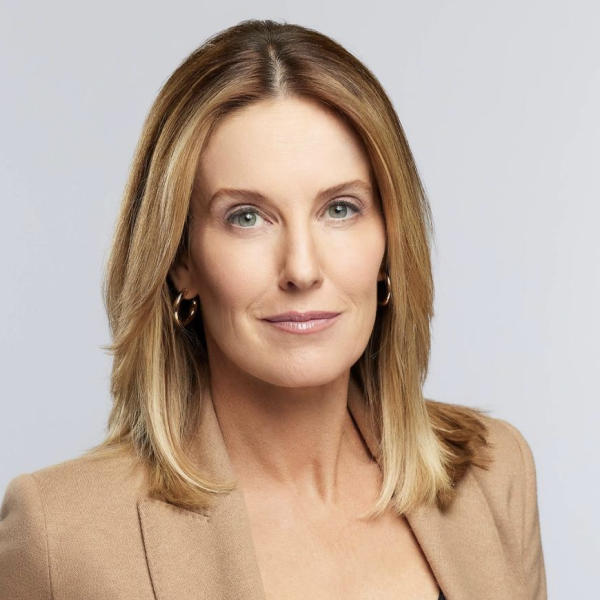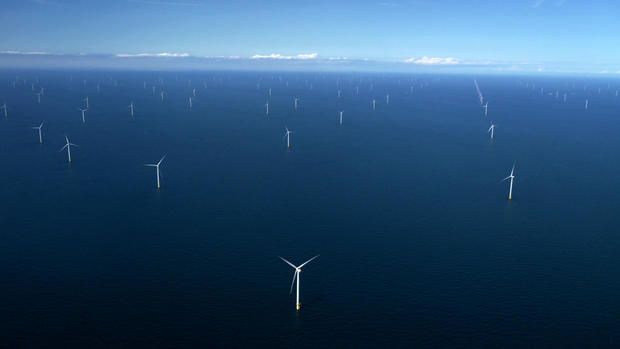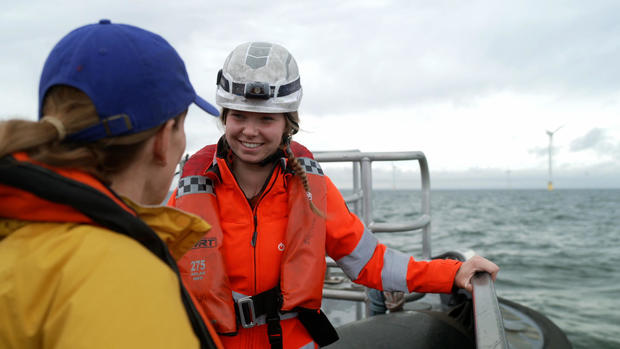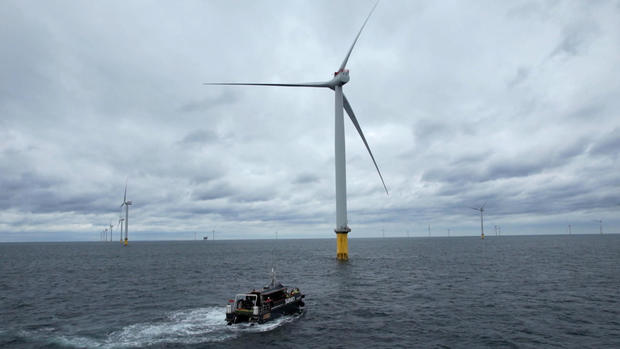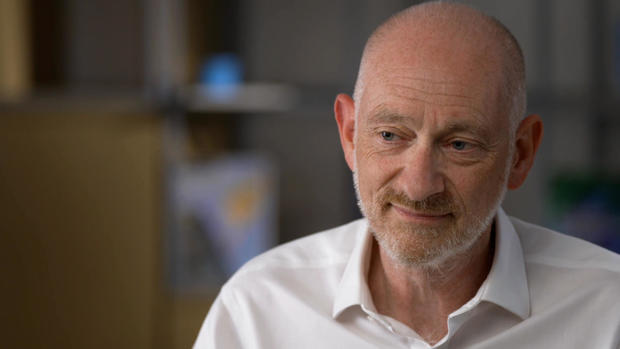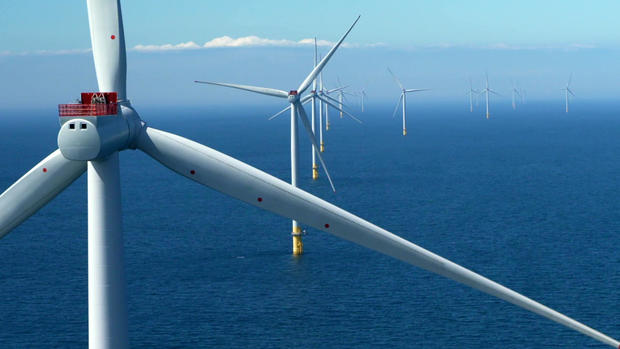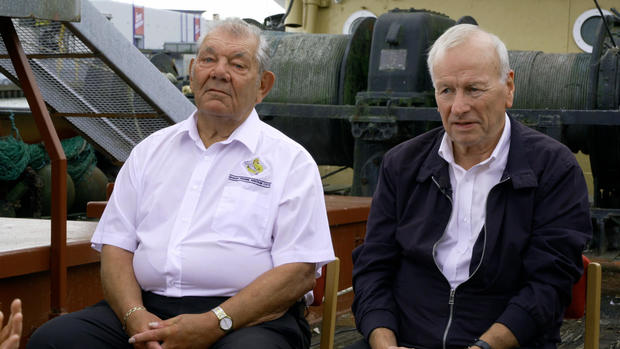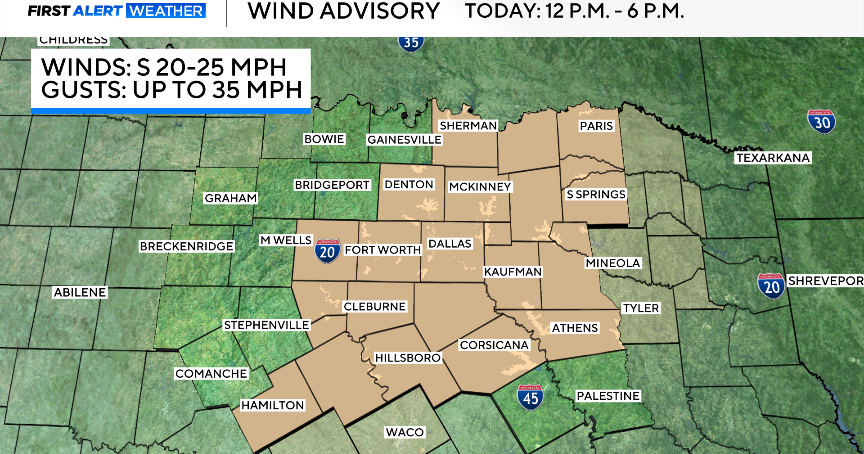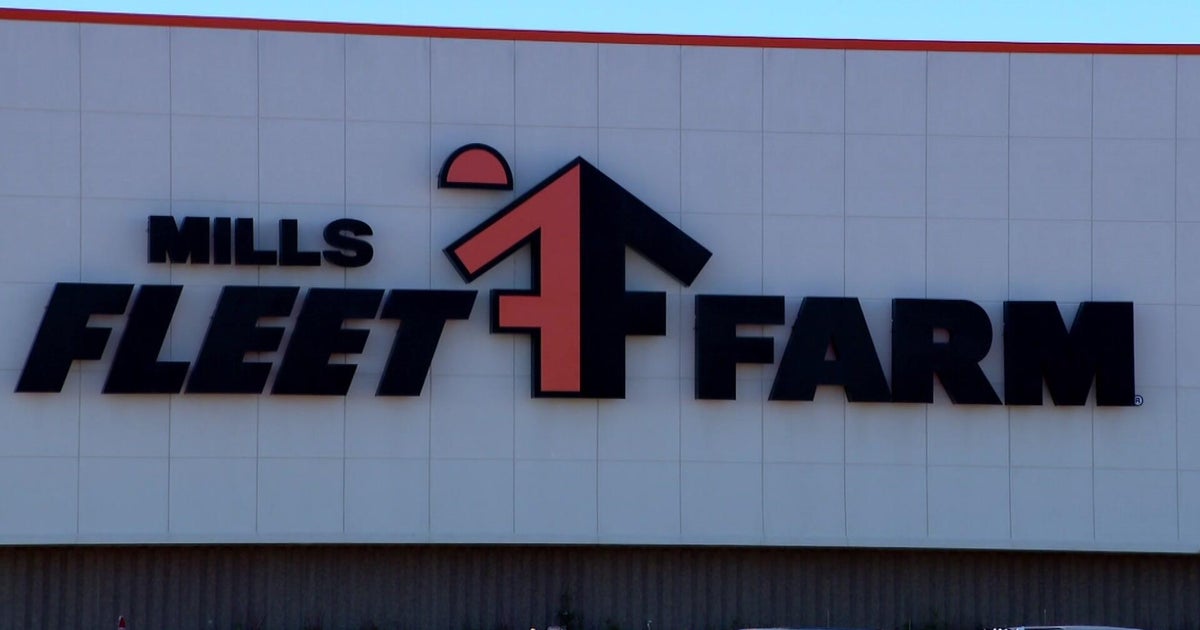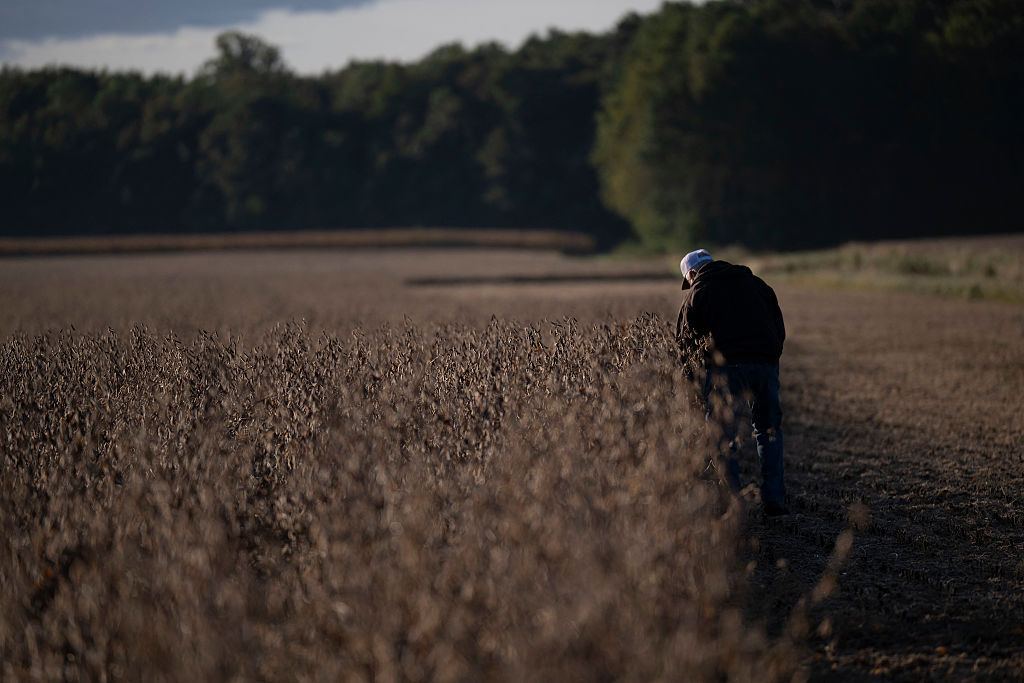Powering England with the world's largest offshore wind farm
This past August, President Biden signed a sweeping climate bill into law, making wind power a priority. Specifically, offshore wind power.
The goal is to capture the force of the wind in the open seas and convert it to power 10 million American homes by 2030.
We have a long way to go. There are only seven offshore wind turbines off the coast of the United States compared to nearly 6,000 in Europe.
Critics say they are expensive to build and maintain -- unpredictable and ugly.
We wanted to see for ourselves. so, we went to the largest offshore wind farm in the world, along the northeast coast of England to discover the power of Grimsby.
As you fly 200 miles north of London, along the coast, you can see the town of Grimsby below. 55 miles east of her port, you can't miss them. Elegant and a little erie, white giants poking out of the North Sea like something out of a science fiction novel.
This is the largest crop of offshore wind turbines in the world - known as the Hornsea Wind Farm. It is hypnotizing. More than 300 turbines spread across 335 square miles generate enough electricity to help power more than 2 million homes a day.
To understand the power, size and upkeep of this evolving technology, we geared up on land and traveled 90 minutes on the heaving North Sea with 24-year-old Bridie Salmon. Her job is to scale and service the turbines. My job, with the help of a little anti-nausea gum was to simply, hold down my lunch.
Sharyn Alfonsi: This is choppy out here.
Bridie Salmon: Yeah. It is. How are you feeling?
Sharyn Alfonsi: I feel-- okay. It's more important "How do you feel?"
Bridie Salmon: Yeah, I'm doing good. Like I say, I'd like to think I've got my sea legs on.
When your last name is Salmon, negotiating rough waters is sort of in your DNA. Bridie's great-grandfather worked on the Grimsby docks. Her dad owns a 100-year-old smoked fish shop in town.
Bridie was bartending when she decided to apply to an apprentice program to be a turbine technician. She was one of seven people selected from a pool of 500.
The apprentice program combines classroom instruction - with hands-on work at sea. But we soon learned that mother nature is a tempermental teacher.
Sharyn Alfonsi: The weather here is ever-changing.
Bridie Salmon: Yeah, yeah, we're holdin' on for our dear lives. Yeah, I mean-- and it is the North Sea. This is not something we can control. So every day is different. And it can change like that. So it's just part and parcel of the job. Anything to get these things turning. This is the environment for wind turbines. It's gotta be windy.
As we approached the turbines, we suddenly felt small.
Sharyn Alfonsi: You don't get a sense of how large things are until you're right up under them--
Bridie Salmon: Yeah, well, that's it. I mean, so at very top, the nacelle-- all the way to the top of the blades is half the size of the Eiffel Tower, which is pretty massive, it is. And because you've got nothing normal to compare it to like a building, you just see these in the distance. And then you're here. And it's-- yeah, they're pretty bloody huge.
Translation: they're nearly 600 feet high with spinning fiberglass blades roughly the length of the world's largest passenger jet. Each blade weights almost 30 tons.
The turbines are partially assembled on shore, then shipped out to sea where each blade is attached with surgical precision to the top of the turbine. Every angle has to be perfect to generate maximum power.
Once installed, keeping them spinning is critical. Offshore wind engineers say one revolution can power one home in the U.K. for 24 hours. And that's where Bridie comes in.
Sharyn Alfonsi: It's raining, it's windy…
Bridie Salmon: Can't wait. Just another day at the office!
In choppy waters, Captain Peter Broughton has to find the 'sweet spot,' maintaining constant contact between the bow and base. Some days the winds are so high and seas so rough, the job can't be done.
On this day, success. Bridie harnesses herself to a cable, leaps to a ladder, and begins the climb rung by rung, eight stories to the top.
On a narrow platform hanging over the north sea, she makes her rounds, carefully inspecting and servicing the turbine. A job, not for the faint of heart.
Sharyn Alfonsi: What was that like the first time you made that climb?
Bridie Salmon: Oh, exhausting. Exhausting. Because you've got all your safety kit on as well so
you've probably got about ten kilograms of harnesses and claws and you've got to be clipped in so you've got that friction of climbing.
Sharyn Alfonsi: I imagine it would be kind of scary.
Bridie Salmon: Yeah, really scary. I remember there was one day it was super windy. So we were up there. And the top of the tower is moving. So, you've got the sea sickness, the motion sickness from the sea, and then the top of the tower's moving. So, all day, you're rocking. And it was cold and windy and I remember coming back onshore, and I was just rocking. I was, like, "I'm on land now. I don't need to rock." But it's-- yeah, it's pretty scary.
Benj Sykes says those kinds of extraordinary efforts are needed in extraordinary times. Sykes is the vice president of offshore wind at Orsted, a Danish-based global energy supplier that runs the Hornsea Wind Farm.
Benj Sykes: You know we have a cost of energy crisis in Europe and in Britain at the moment. That's driven by the pandemic but also of course by the terrible situation in Ukraine. And all that adds up to a real drive to find clean, cheap energy solutions.
About five years ago, Orstead decided to sell off it's oil and gas business and focus on renewable energies. Grimsby, a depressed fishing town, became the unlikely backdrop to Europe's clean energy movement.
Sharyn Alfonsi: Why here? Why Grimsby?
Benj Sykes: It's got a good port. And it's geographically really well located. Physically in terms of the water depth, in terms of the wind resource and of course places to connect to the national grid so that we can get that power to homes and businesses.
Long before Russia's invasion of Ukraine set off the energy crisis, the U.K. had a strategy to use 100% clean or renewable electricity by 2035.
Sharyn Alfonsi: When you talk about clean energy, you talk about solar, hydro power, bio fuels. What makes offshore wind unique?
Benj Sykes: Offshore wind is really the only project in most countries where you can build it at the kind of power-station scale that we need. If I think about the projects we're building here in the UK. That's almost 3 gigawatts. That's broadly speaking, the output of a nuclear power station. So, we're talking large-scale infrastructure projects. Most of Europe is too populated, to fit very very large wind farms or solar farms. So that's why we've gone offshore.
Sharyn Alfonsi: One big criticism is cost. They're expensive to construct, to transmit and to decommission. Is that cost passed on to consumers.
Benj Sykes: So that's simply wrong. Offshore wind power is one of the cheapest forms of electricity generation in the U.K. We privately fund it together with investment partners that we bring in.
Sharyn Alfonsi: Privately, you fund that.
Benj Sykes: Yeah. There's no public exposure to the costs of building offshore wind. And I think the thing that has made the most difference is the fact that we've had political consensus now for more than a decade and that's given investors confidence to step in and put the big money on the table to get these projects away.
Gas and nuclear still make up a majority of the power supply flowing into U.K. homes and business, but this year 13% of Britain's energy has come from offshore wind. Only China produces more offshore wind power than the U.K.
Here's how it works. Wind turns the blades around a shaft inside the turbine which spins a generator. Energy then travels down, going 300 feet beneath the water's surface to cables buried under the seabed – connecting to an offshore substation.
Then, to a power station on land where that electricity created out at sea is transferred into homes and businesses, inviting the question, what happens if the wind stops blowing?
Benj Sykes: Using satellites and other technology we can predict extremely accurately how much we're going to generate over the next days which enables those who operate the grid to make very clear plans about where demand is going, where supply is going. I mean, if I look at the turbines that we have out in Hornsea, they are operating 98-99% of the time.
This is Grimsby's second act. Through the 1950s to 1970 the town hosted the largest fishing fleet in the world, with 700 trawlers, awash in cash and a port fit for a visit from the queen.
Dennis Avery: It was absolutely brilliant the camaraderie of it because you can say nearly 100% of the population would be associated with the fishin' industry in some way.
Dennis Avery and Bob Formby were part of the town's fishing tradition.
Sharyn Alfonsi: what was it like?
Bob Formby: It's a tough job. It's work from sailing till you get back in the port again. Working in the winter around Iceland and them places was pretty severe. But it's the kind of job that I'd do again tomorrow.
Dennis Avery: In those days You had two choices: you worked on the docks, or you went to sea.
Avery captained this hulking steel fishing trawler, the Ross Tiger, for eight years.
Dennis Avery: If you caught a good trip, and you steam back to Grimsby with a fish room full of fish, you know it's a marvelous feeling.
That marvelous feeling ended when Iceland – Britain's neighbor to the north - began enforcing fishing restrictions in their cod-rich waters.
Sharyn Alfonsi: What did you see happen in town when that happened?
Bob Formby: Gosh. It was a disaster, to be quite honest. Because everybody was involved some way in fishing. Like taxi drivers, the pubs, the dress shops, and places like that-- they all suffered.
Dennis Avery: Once the fishin' sorta went, it all sorta died a death.
Wind power has breathed new life into Grimsby. Offshore energy company Orsted says it has created over 500 jobs here and invested $11 billion in local wind farms.
But there are plenty of people who worry the environmental impact of the wind turbines hasn't been sufficiently studied and others say the industry has not created the number of jobs they have promised, but the concern of these retired fishermen is more practical.
Bob Formby: We're not seeing benefits.
Sharyn Alfonsi: Your electricity bill hasn't gone down?
Bob Formby: No. It's gone up if anything. When they said about em how 'Oh, we're going to get cheap electricity and it's going to be green and everything.' But I can't see any benefits to be quite honest.
Sharyn Alfonsi: Has your electricity bill gone down?
Dennis Avery: Try double! It's doubled.
Sharyn Alfonsi: There are people who have said, 'Yeah, we've got all these turbines. But our electricity bill hasn't gone down a cent.'
Benj Sykes: Yeah, it's a real challenge that. It's gonna take time. Because we need to build more offshore wind.
Sharyn Alfonsi: So you think if there's more offshore wind, prices could go down?
Benj Sykes: Yeah absolutely.
Fearing the war in Ukraine could lead to blackouts this winter, the U.K. government announced more drilling for oil and gas in the North Sea. They will also speed up the time it takes for new offshore wind projects to get online.
Benj Sykes told us that over the next eight years, Orsted plans to invest another $17 billion in wind farms and add more than 300 jobs in Grimsby.
Benj Sykes: You know the fishing industry was fantastic for Grimsby. That era has passed. What we want to do is be a part of creating the next chapter of Grimsby's life and of the country's life as we build out.
A chapter Bridie Salmon is very much a part of.
Bridie Salmon: So that's gone from Grimsby being the fishing town, to the powerhouse of the north, which is an amazing transition.
Sharyn Alfonsi: Proud of it?
Bridie Salmon: So proud of it. And to be a part of it is amazing.
A town's future and fortune, once again tied to the sea.
Produced by Ashley Velie. Associate producer, Jennifer Dozor. Broadcast associate, Elizabeth Germino. Edited by April Wilson.
